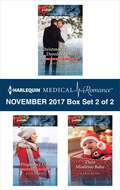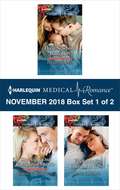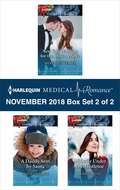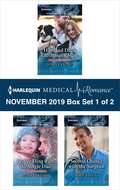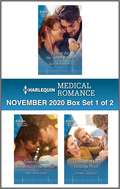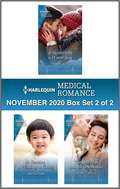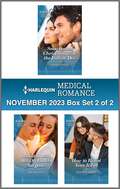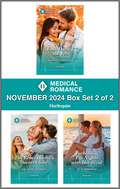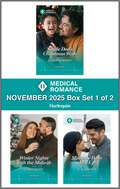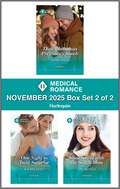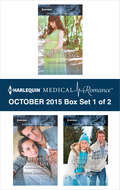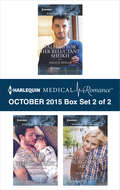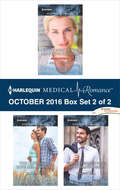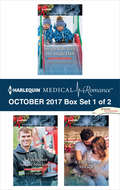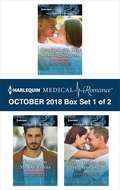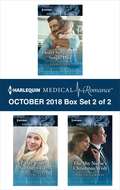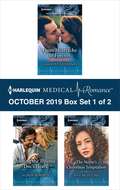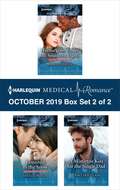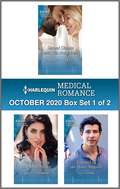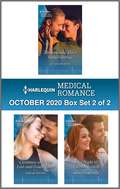- Table View
- List View
Harlequin Medical Romance November 2017 - Box Set 2 of 2: Christmas with Her Daredevil Doc\Their Pregnancy Gift\Their Mistletoe Baby
by Kate Hardy Karin BaineHarlequin® Medical Romance brings you a collection of three new titles, available now! Enjoy these stories packed with pulse-racing romance and heart-racing medical drama. This Harlequin Medical Romance box set includes: CHRISTMAS WITH HER DAREDEVIL DOCMiracles at Muswell Hill Hospitalby Kate Hardy Dr. Hayley Clark and Sam Price's holiday romance was unforgettable—and unrepeatable! Then risk-taking doc Sam arrives at her hospital… Could their fling become something more? THEIR PREGNANCY GIFTMiracles at Muswell Hill Hospitalby Kate Hardy He never wanted children…but one night of passion with Dr. Danielle Owens results in shocking and wonderful consequences for IVF consultant Alex Morgan. THEIR MISTLETOE BABY by Karin Baine Can an unexpected pregnancy bring nurse Freya Brodie and her husband, Lucas, back together and make her dreams come true? Join HarlequinMyRewards.com to earn FREE books and more. Earn points for all your Harlequin purchases from wherever you shop.
Harlequin Medical Romance November 2018 - Box Set 1 of 2: Their Newborn Baby Gift\One Night, One Unexpected Miracle\Firefighter's Christmas Baby
by Catherine Anderson Alison Roberts Annie ClaydonHarlequin Medical Romance brings you a collection of three new titles, available now! Enjoy these stories packed with pulse-racing romance and heart-racing medical drama.This Harlequin Medical Romance box set includes:THEIR NEWBORN BABY GIFTHope Children’s Hospitalby Alison RobertsPlayboy surgeon Ryan Walker is devoted to mending an abandoned baby girl’s heart… Will he lose his own to shy receptionist Evie Cooper in the process?ONE NIGHT, ONE UNEXPECTED MIRACLEHope Children’s Hospitalby Caroline AndersonHis buttoned-up boss, Alice Baxter, is expecting his baby! Now Italian surgeon Marco Ricci’s determined to claim his family…and her heart, too!FIREFIGHTER’S CHRISTMAS BABYby Annie ClaydonThey shared a sizzling festive fling… Then alluring paramedic Callie turns up on committed bachelor and firefighter Ben’s doorstep—pregnant!
Harlequin Medical Romance November 2018 - Box Set 2 of 2: New Year Wedding for the Crown Prince\A Daddy Sent by Santa\Midwife Under the Mistletoe
by Meredith Webber Susan Carlisle Karin BaineHarlequin Medical Romance brings you a collection of three new titles, available now! Enjoy these stories packed with pulse-racing romance and heart-racing medical drama.This Harlequin Medical Romance box set includes:NEW YEAR WEDDING FOR THE CROWN PRINCEby Meredith WebberFor Crown Prince Charles and Dr. Jo Wainwright, being stranded together this Christmas leads to a magical connection and an unexpected proposal…A DADDY SENT BY SANTAby Susan CarlisleSingle mom nurse Lauren Wilson never expected big-city doc Paxton Samuels to stay in her Oklahoma town, but dare she wish for a family this Christmas?MIDWIFE UNDER THE MISTLETOEby Karin BaineGP Fraser McColl longs for a family, and when he’s thrown together with gorgeous midwife Iona to care for two children, he’s tempted to believe in miracles…
Harlequin Medical Romance November 2019 - Box Set 1 of 2
by Susan Carlisle Annie Claydon Robin GiannaHarlequin Medical Romance brings you a collection of three new titles, available now! Enjoy these stories packed with pulse-racing romance and heart-racing medical drama.This Harlequin Medical Romance box set includes:HIGHLAND DOC’S CHRISTMAS RESCUE Pups that Make Miraclesby Susan CarlisleCould a festive fling with Heatherglen clinic manager Dr. Lyle Sinclair help injured and heartbroken rescue worker Cass Bellow recover her lust for life? FESTIVE FLING WITH THE SINGLE DADPups that Make Miraclesby Annie ClaydonPhysiotherapist Flora’s helping new neighbor and Heatherglen’s new vet Aksel connect with his recently discovered daughter. Only it’s their connection that’s irresistible…SECOND CHANCE WITH THE SURGEONby Robin GiannaWhen Jillian Keyser breaks her wrist, leading orthopedic surgeon Conor McCarthy’s her only option. Problem is…he’s her ex-husband!
Harlequin Medical Romance November 2019 - Box Set 2 of 2
by Meredith Webber Tina Beckett Charlotte HawkesHarlequin Medical Romance brings you a collection of three new titles, available now! Enjoy these stories packed with pulse-racing romance and heart-racing medical drama.This Harlequin Medical Romance box set includes:A CHRISTMAS KISS WITH HER EX-ARMY DOCby Tina BeckettYears after their passionate kiss, nurse Hollee’s stunned when ex-army doc Clancy begins working at her hospital—and their desire reignites!THE DOCTORS’ CHRISTMAS REUNIONby Meredith WebberHeartbreaking loss tore doctors Ellie and Andy’s marriage apart. But, temporarily joining forces to care for an abandoned baby, they’re falling in love again!UNWRAPPING THE NEUROSURGEON’S HEARTby Charlotte HawkesSeeing the compassion beneath neurosurgeon Solomon Gunn’s playboy reputation, ER doc Anouk Hart longs to unleash the real Solomon—forever…
Harlequin Medical Romance November 2020 - Box Set 1 of 2
by Alison Roberts Susan Carlisle Traci DouglassHarlequin Medical Romance brings you a collection of three new titles, available now! Enjoy these stories packed with pulse-racing romance and heart-racing medical drama.This Harlequin Medical Romance box set includes:FALLING FOR THE SECRET PRINCEChristmas at Seattle GeneralBy Alison RobertsDr Dom’s world literally crashes through the ER doors when his father — a King! — is involved in an accident. Now, Emilia finds herself keeper of his royal secret — and his heart!NEUROSURGEON’S CHRISTMAS TO REMEMBER Christmas at Seattle General By Traci DouglassWhen Max is brought in to operate on a King, PR director Ayanna must help him keep it secret. But spending Christmas together, ignites an unforgettable attraction!THE SINGLE DAD’S HOLIDAY WISH By Susan Carlisle For Dr. Carter, Christmas only holds painful memories. But Dr Liz offers a safe harbor, and the promise of a future Carter thought lost to him…
Harlequin Medical Romance November 2020 - Box Set 2 of 2
by Tina Beckett Annie Claydon Amy RuttanHarlequin Medical Romance brings you a collection of three new titles, available now! Enjoy these stories packed with pulse-racing romance and heart-racing medical drama.This Harlequin Medical Romance box set includes:IT STARTED WITH A WINTER KISSBy Tina Beckett Dr Dexter always has a plan. He just hadn’t planned on an ER reunion with his high school sweetheart, Maura! A REUNION, A WEDDING, A FAMILY By Amy RuttanTen years ago, Jimmy left Candice broken-hearted when he joined the army. Now, the paramedic is back — and she’s his boss! THE BEST MAN AND THE BRIDESMAID By Annie Claydon When disaster after disaster threaten her best friend’s wedding, Andrea realizes best man Cal is the only one who can help her…
Harlequin Medical Romance November 2023 - Box Set 1 of 2
by Ann McIntosh Juliette Hyland Julie DanversHarlequin Medical Romance brings you a collection of three new titles, available now! Enjoy these stories packed with pulse-racing romance and heart-racing medical drama.This Harlequin Medical Romance box set includes:THE NURSE&’S HOLIDAY SWAPBoston Christmas Miracles By Ann McIntoshPediatric nurse Ailani longs for a white Christmas, so she swaps sunny Hawaii for a temporary job in Boston. Ailani expects icy temperatures…but her boss, Javier, is scorching hot! This single dad&’s disillusioned with…everything. She&’s lost more than most, but can Ailani prove he&’s wrong before the holidays are over?A PUPPY ON THE 34th WARDBoston Christmas MiraclesBy Juliette HylandJilted on her honeymoon, Bryn Bedford is forgoing men. Healing little patients with her therapy dog, Honey, is the distraction she needs this Christmas. Gorgeous new pediatrician Nick Walker is not! But Nick playing Santa melts her heart. Honey trusts Nick…will Bryn ever believe he&’s the real deal?KEY TO THE SINGLE DAD&’S HEARTBy Julie DanversArriving in Key West to claim her inherited obstetrics practice, Dr. Olivia is stunned by her instant annoyance—and connection!—with new partner, widowed single dad Dr. Hunter. But as they grow closer, she&’s tempted to lower her guard for the first time. Can Hunter do the same?
Harlequin Medical Romance November 2023 - Box Set 2 of 2
by Amy Ruttan Annie O'Neil Rachel DoveHarlequin Medical Romance brings you a collection of three new titles, available now! Enjoy these stories packed with pulse-racing romance and heart-racing medical drama.This Harlequin Medical Romance box set includes:SNOWBOUND CHRISTMAS WITH THE ITALIAN DOCBy Annie O&’NeilDr. Natalie&’s spending Christmas working in the Italian Alps, keeping herself busy following another(!) break-up. What she hadn&’t factored in was sexy, caring GP, Gio! But Natalie&’s on her guard this time. Until an abandoned infant temporarily needs their care. Will they embrace the spirit of the season …together?REUNITED WITH HER OFF-LIMITS SURGEONBy Amy RuttanDeaf audiologist Maeve hasn&’t seen Finn since their stolen night ten years ago. Now he&’s her hospital&’s temporary ENT surgeon—and sparks are still flying! Finn isn&’t staying, but Maeve has people who depend on her. So, a relationship is off-limits! But denying their attraction has never been easy…HOW TO RESIST YOUR RIVALBy Rachel DoveRobotics scientist Harper dreams of helping prosthetics patients worldwide. The problem? Infuriating neurosurgeon Dr. Dom. This man raises her temper—and her pulse! But despite a series of heated clashes, his cold exterior begins to melt. Soon, cautious Harper finds resisting her rival an impossible task …
Harlequin Medical Romance November 2024 - Box Set 1 of 2
by Alison Roberts Louisa Heaton Karin BaineHarlequin Medical Romance brings you a collection of three new titles, available now! Enjoy these stories packed with pulse-racing romance and heart-racing medical drama.This Harlequin Medical Romance box set includes:CITY VET, COUNTRY TEMPTATIONBy Alison RobertsVet Andi is unimpressed when she must fill in at a country clinic, devastatingly close to the site of her parents&’ fatal accident. Yet, she&’ll do anything to secure her hard-earned promotion—even work with frustratingly attractive new colleague Jack! Jack&’s first impression of the stunning high-heeled city doc and her schnoodle is that they&’re completely unsuited to farm life. But as his professional respect for Andi grows, so does his desire... Whilst Jack&’s cautious of being hurt again, indulging in temporary temptation is inevitable. Only, when Andi&’s time is up, will they be ready to let go?FESTIVE FLING WITH THE SURGEONChristmas North and SouthBy Karin BaineTransplant surgeon Tamsin is determined nobody will suffer the post-op complications her sister faced. She certainly doesn&’t have capacity for romance. So, succumbing to passion on a visit to Edinburgh with handsome pediatrician Max is a one-night indulgence... Max has his own reasons for being anti-commitment, but when he and Tamsin are thrown back together again temporarily, their snow-melting attraction leads to a whirlwind fling. Only, their feelings are deepening along with their desire. This festive season, will they be brave and embrace the gift in front of them? A MISTLETOE MARRIAGE REUNIONChristmas North and SouthBy Louisa HeatonOnce her children left home, Lauren could finally pursue her surgical dreams. Sadly, her marriage to surgeon, Oliver, didn&’t survive the different directions life took them… A decade later, she&’s back in London and face-to-face with her ex-husband—who&’s annoyingly more gorgeous than ever! Oliver understands why they fell apart, so he&’s surprised at the attraction still sizzling between them… Soon, they&’re reconnecting over hot chocolates and even hotter mistletoe kisses! Dating again is fun, but with their history, can they risk taking things any further?
Harlequin Medical Romance November 2024 - Box Set 2 of 2
by JC Harroway Deanne Anders Juliette HylandHarlequin Medical Romance brings you a collection of three new titles, available now! Enjoy these stories packed with pulse-racing romance and heart-racing medical drama.This Harlequin Medical Romance box set includes:FAKE DATING THE VETBy Juliette HylandIn the run up to Halloween, Vet Violet is focused on finding a fake date for a wedding where she&’ll have to see her abhorrent ex. Joking to good-looking emergency vet tech, Beck, that he could step in - she doesn&’t expect him to agree! Violet&’s always had a thing for Beck, but at ten years her junior she knows the thrill-seeking maverick isn&’t looking for anything serious. And with everything she&’s been through, she dreams of a happy-ever-after. Yet pretending to be the perfect couple makes them wonder whether it&’s really just an act…THE REBEL DOCTOR&’S SECRET CHILDNashville MidwivesBy Deanne AndersDr. Knox&’s reputation precedes him...As the son of country music royalty, he has always been the center of attention. And his first day as a temporary obstetrician at Legacy Women&’s Clinic is no exception. The rumor mill has been in overdrive since the reformed bad boy arrived. But it&’s midwife-in-training, Brianna, who has a revelation that will truly shake the foundations of Knox&’s carefree existence. Because she&’s kept a six-year-old secret that could force the rebel doc to finally consider becoming a forever family man…FORBIDDEN FIJI NIGHTS WITH HER RIVALBy JC HarrowayTrauma surgeon Della has a love-hate relationship with her work rival and brother&’s best friend, Harvey. Three years ago, fresh from a messy divorce, she recklessly succumbed to the uncontainable need they shared. Then she discovered Harvey had stolen a job out from under her! Now, stuck working together in Fiji, their verbal sparring is still as thrilling as it is infuriating. Della is acutely aware of how fine the line is between loathing…and longing. Is it simply a matter of time before they pick up where they left off…?
Harlequin Medical Romance November 2025 - Box Set 1 of 2
by Alison Roberts Karin Baine JC HarrowayHarlequin Medical Romance – November &‘25 – Box Set 1 of 2Harlequin Medical Romance brings you a collection of three new titles, available now! Enjoy these stories packed with pulse-racing romance and heart-racing medical drama.This Harlequin Medical Romance box set includes:SINGLE DAD&’S CHRISTMAS WISHBy Alison RobertsHis son&’s emergency surgery leaves pediatric doctor and single dad Noa wishing for a miracle. Thankfully, little Robin&’s nurse Eva is their Christmas angel and a lifeline throughout his recovery. Yet, in those quieter moments on the ward, Noa catches glimpses of the pain beneath Eva&’s holiday cheer. And for the first time since his wife passed, he finds himself being vulnerable in return. Their attraction is as unstoppable as the snowfall. But is it a gift Noa&’s ready to accept?WINTER NIGHTS WITH THE MIDWIFEBy Karin BaineNewly divorced midwife Ginger has put her dreams on hold long enough. Landing a job with her old friend, Head of Midwifery Ryan, is a fresh start. What&’s less ideal? Ryan&’s familiar determination to maintain his distance. Yet working together to keep their tiny charges safe, Ginger slowly breaks through his icy walls, unleashing a connection thirty years in the making! But with her aspirations finally on track, can Ginger risk starting anything more than a festive fling?MISTLETOE BABY MIX-UPBy JC HarrowaySurgeon Connie Dubois has one resolution in life: stay single! That&’s what a cheating ex-fiancé will do to you. But she does want to become a mother. She just never thought it would be quite so complicated… This Christmas, a fertility clinic mix-up means she&’s having a baby with the last man she&’d ever consider having a child with! Fellow surgeon Théo Augustin is her best friend&’s brooding brother, her workplace rival… and a man whose arrogance she shouldn&’t find so deeply and dangerously attractive!
Harlequin Medical Romance November 2025 - Box Set 2 of 2
by Amy Ruttan Annie O'Neil Rachel DoveHarlequin Medical Romance – November &‘25 – Box Set 2 of 2Harlequin Medical Romance brings you a collection of three new titles, available now! Enjoy these stories packed with pulse-racing romance and heart-racing medical drama.This Harlequin Medical Romance box set includes:THEIR CHRISTMAS PREGNANCY SHOCKBy Annie O&’NeilAfter a life-changing accident, Dr. Matti Meadows&’ ex-fiancée left her heart in tatters. So, the chance to move to Copenhagen and lead a project harnessing the healing powers of hygge for patients feels like a Christmas miracle! And a sizzling night with sexy stranger, Felix Beck? That&’s just the winter warmer Matti needs… Until they&’re reunited as unexpected colleagues—who&’ve just broken Felix&’s no dating rule! But they&’re about to learn that their unwitting mixing of business with pleasure has consequences beyond their wildest dreams…ONE NIGHT TO TWIN SURPRISEBy Rachel DoveNurse Neve is determined to get her mojo back after her bitter divorce. Her plan? One night of no-strings passion! Outback helicopter doc Colton is the perfect candidate. But as her ex&’s best friend, he&’s always been firmly off-limits—which is now fanning the flames of forbidden desire! Their steamy tryst is everything Neve imagined…until she discovers she&’s pregnant with twins! Yet Colton&’s placement is only temporary. Can Neve trust that her nomadic doc will stay, and be her family&’s safe place to land?SNOWBOUND WITH THE SINGLE MOMBy Amy RuttanAfter losing her husband, paramedic Pauly&’s put everything into raising her son. So when her former med school classmate, Ares, offers to come and help out, she&’s ecstatic. Ares is kind, courageous, and brilliant with Jeremy… Only, has he always been quite so gorgeous? Any sparks flying between them must be ignored: Ares&’ friendship is too important to risk. Then an avalanche traps them together while on a call… How long can Pauly really resist the gorgeous Greek who knows her better than anyone?
Harlequin Medical Romance October 2015 - Box Set 1 of 2
by Carol Marinelli Lynne Marshall Emily ForbesHarlequin® Medical Romance brings you three new titles at a great value, available now! Enjoy these stories packed with pulse-racing romance and heart-racing medical drama.This Harlequin® Medical Romance box set includes:THE BABY OF THEIR DREAMSby Carol MarinelliResisting Dr. Dominic Edwards's scorching touch isn't easy…Cat returns home sun-kissed and accidentally pregnant!HOT-SHOT DOC, SECRET DAD Cowboys, Doctors…Daddies by Lynne MarshallTrevor Montgomery has never forgotten his one night with nurse Julie…but he's shocked to discover he's a father!HIS LITTLE CHRISTMAS MIRACLE by Emily ForbesReunited with her childhood sweetheart, Lucas White, Jess has another Christmas miracle in store--their adorable little daughter, Lily!Look for six new captivating love stories every month from Harlequin® Medical Romance!
Harlequin Medical Romance October 2015 - Box Set 2 of 2
by Molly Evans Lynne Marshall Amalie BerlinHarlequin® Medical Romance brings you three new titles at a great value, available now! Enjoy these stories packed with pulse-racing romance and heart-racing medical drama.This Harlequin® Medical Romance box set includes:FALLING FOR HER RELUCTANT SHEIKH by Amalie BerlinCould gorgeous sheikh Khalil Al-Akkari hold the key to sleep therapist Adalyn's locked-away heart?FATHER FOR HER NEWBORN BABY Cowboys, Doctors…Daddies by Lynne MarshallFamed cardiologist Cole Montgomery falls head over heels for beautiful Lizzie…and her newborn daughter, too!SAFE IN THE SURGEON'S ARMS by Molly EvansSurgeon Chase Montgomery is determined to show Emily that in his arms, she'll always be safe…Look for six new captivating love stories every month from Harlequin® Medical Romance!
Harlequin Medical Romance October 2016 - Box Set 1 of 2: Waking Up to Dr. Gorgeous\One Kiss in Tokyo...\Reawakened by the Surgeon's Touch
by Jennifer Taylor Emily Forbes Scarlet WilsonHarlequin® Medical Romance brings you a collection of three new titles, available now! Enjoy these stories packed with pulse-racing romance and heart-racing medical drama. This Harlequin Medical Romance box set includes: WAKING UP TO DR. GORGEOUSThe Christmas Swap by Emily Forbes Luci Dawson's house swap to Sydney results in a hot fling with Dr. Seb Hollingsworth...exactly what she wants this Christmas! ONE KISS IN TOKYO... by Scarlet Wilson Dr. Avery Flynn's kisses tempt nurse Katsuko Williams to break her rules... Now can she tame this restless adventurer? REAWAKENED BY THE SURGEON'S TOUCH by Jennifer TaylorSurgeon Jude Slater reawakens Claire Morgan's wounded soul... Is he the man to finally heal her heart? Join HarlequinMyRewards.com to earn FREE books and more. Earn points for all your Harlequin purchases from wherever you shop.
Harlequin Medical Romance October 2016 - Box Set 2 of 2: Swept Away by the Seductive Stranger\The Courage to Love Her Army Doc\Second Chance with Lord Branscombe
by Joanna Neil Amy Andrews Karin BaineHarlequin® Medical Romance brings you a collection of three new titles, available now! Enjoy these stories packed with pulse-racing romance and heart-racing medical drama. This Harlequin Medical Romance box set includes: SWEPT AWAY BY THE SEDUCTIVE STRANGERThe Christmas Swap by Amy AndrewsFelicity Mitchell shares one wild night with Dr. Callum Hollingsworth--only to discover he's her new boss! THE COURAGE TO LOVE HER ARMY DOC by Karin Baine Army doc Joe Braden makes Emily Clifford feel beautiful for the first time, but can she find the courage to love him? SECOND CHANCE WITH LORD BRANSCOMBE by Louisa HeatonAristocrat Nate Branscombe returns to convince Dr. Sophie Trent that this time, true love is here to stay! Join HarlequinMyRewards.com to earn FREE books and more. Earn points for all your Harlequin purchases from wherever you shop.
Harlequin Medical Romance October 2017 - Box Set 1 of 2: Sleigh Ride with the Single Dad\A Firefighter in Her Stocking\A Christmas Miracle
by Alison Roberts Amy Andrews Janice LynnHarlequin® Medical Romance brings you a collection of three new titles, available now! Enjoy these stories packed with pulse-racing romance and heart-racing medical drama. This Harlequin Medical Romance box set includes: SLEIGH RIDE WITH THE SINGLE DADChristmas in Manhattanby Alison Roberts Dr. Grace Forbes is reunited with old flame ER chief Charles Davenport—can the single dad and his adorable twins make her Christmas wish come true? A FIREFIGHER IN HER STOCKINGChristmas in Manhattanby Janice Lynn When her playboy neighbor, hunky firefighter Jude Davenport, suggests a festive fling, Dr. Sarah Grayson is powerless to resist… A CHRISTMAS MIRACLE by Amy Andrews Independent single mom Trinity Walker can't help falling for brooding former army surgeon Reid Hamilton when the knight in motorcycle gear comes to her rescue. Join HarlequinMyRewards.com to earn FREE books and more. Earn points for all your Harlequin purchases from wherever you shop.
Harlequin Medical Romance October 2017 - Box Set 2 of 2: Reunited with Her Surgeon Prince\Falling for Her Fake Fiancé\The Family She's Longed For
by Marion Lennox Lucy Clark Sue MackayHarlequin® Medical Romance brings you a collection of three new titles, available now! Enjoy these stories packed with pulse-racing romance and heart-racing medical drama. This Harlequin Medical Romance box set includes: REUNITED WITH HER SURGEON PRINCEby Marion Lennox Duty tore their whirlwind marriage apart, but to claim his son as heir, surgeon and crown prince Marc Falken must convince Ellie they can finally be a family. FALLING FOR HER FAKE FIANCÉby Sue MacKay Kelli Barnett needs a fiancé for a family wedding… Enter her delectable boss, Mac Taylor—whose kisses are throwing her senses into overdrive! THE FAMILY SHE'S LONGED FORThe Lewis Doctors by Lucy Clark Can surgeon Virgil Arterton convince Dr. Carla Lewis that this time he can give her the love and family she longs for? Join HarlequinMyRewards.com to earn FREE books and more. Earn points for all your Harlequin purchases from wherever you shop.
Harlequin Medical Romance October 2018 - Box Set 1 of 2: Reunited with Her Brooding Surgeon\Tempted by Mr. Off-Limits\Second Chance with Her Army Doc
by Amy Andrews Dianne Drake Emily ForbesHarlequin Medical Romance brings you a collection of three new titles, available now! Enjoy these stories packed with pulse-racing romance and heart-racing medical drama.This Harlequin Medical Romance box set includes:REUNITED WITH HER BROODING SURGEONNurses in the Cityby Emily ForbesWhen she’s reunited with handsome surgeon Marcus Washington, Grace Gibson knows he hides a wealth of pain… But can she heal his heart?TEMPTED BY MR. OFF-LIMITSNurses in the Cityby Amy AndrewsGiving in to temptation for just one night with paramedic Hamish Gibson will surely be enough—until nurse Lola discovers it isn’t…SECOND CHANCE WITH HER ARMY DOCby Dianne DrakeDetermined to finally get over army doc Carter Holmes, heart surgeon Sloane heads for a desert vacation — only to find Carter’s there too!
Harlequin Medical Romance October 2018 - Box Set 2 of 2: Heart Surgeon to Single Dad\NY Doc Under the Northern Lights\The Shy Nurse's Christmas Wish
by Janice Lynn Abigail Gordon Amy RuttanHarlequin Medical Romance brings you a collection of three new titles, available now! Enjoy these stories packed with pulse-racing romance and heart-racing medical drama.This Harlequin Medical Romance box set includes:HEART SURGEON TO SINGLE DADby Janice LynnAfter suddenly becoming his goddaughter’s guardian, surgeon Matthew Coleman takes a job back home…and comes face-to-face with recent fling Dr. Natalie Sterling!NY DOC UNDER THE NORTHERN LIGHTSby Amy RuttanWhen brokenhearted Betty Jacinth arrives in Iceland, she doesn’t expect the flame that ignites between her and brooding Dr. Axel Sturlusson…THE SHY NURSE’S CHRISTMAS WISHby Abigail GordonDarcey Howard’s quiet, safe existence is about to be shattered by the last man she should fall for—enigmatic surgeon Daniel Osbourne.
Harlequin Medical Romance October 2019 - Box Set 1 of 2
by Caroline Anderson Alison Roberts Ann McIntoshHarlequin Medical Romance brings you a collection of three new titles, available now! Enjoy these stories packed with pulse-racing romance and heart-racing medical drama.This Harlequin Medical Romance box set includes:FROM HEARTACHE TO FOREVER Yoxburgh Park Hospitalby Caroline AndersonThey’ve experienced passion, pregnancy and the heartache of losing their unexpected baby. Working together again, can trauma specialist Ryan and nurse Beth finally find happy-ever-after?MELTING THE TRAUMA DOC’S HEARTby Alison RobertsRenowned surgeon Olivia’s just whirled into trauma doctor Zac’s small town…and she might be the one to heal his frozen heart.THE NURSE’S CHRISTMAS TEMPTATIONby Ann McIntoshOn a remote Scottish island, nurse Harmony’s organized world is thrown completely off balance by her fierce attraction to daredevil doctor Cameron.
Harlequin Medical Romance October 2019 - Box Set 2 of 2
by Traci Douglass Amalie Berlin Robin GiannaHarlequin Medical Romance brings you a collection of three new titles, available now! Enjoy these stories packed with pulse-racing romance and heart-racing medical drama.This Harlequin Medical Romance box set includes:HIS SURGEON UNDER THE SOUTHERN LIGHTSDoctors Under the Starsby Robin GiannaOne kiss, a temporary fling… Then danger strikes and lone-wolf marine biologist Zeke and independent Dr. Jordan realize their feelings are anything but temporary!REUNITED IN THE SNOWDoctors Under the Starsby Amalie BerlinWhen a new doctor arrives at the Antarctic station, brooding Weston MacIntyre comes face-to-face with Lia Monterrosa—his ex-fiancée!A MISTLETOE KISS FOR THE SINGLE DADby Traci DouglassCould a mistletoe kiss with his childhood sweetheart, high-flying surgeon Belle, spark a second chance for small-town GP Nick…?
Harlequin Medical Romance October 2020 - Box Set 1 of 2
by Lucy Ryder Charlotte HawkesHarlequin Medical Romance brings you a collection of three new titles, available now! Enjoy these stories packed with pulse-racing romance and heart-racing medical drama.This Harlequin Medical Romance box set includes:SECOND CHANCE WITH HIS ARMY DOCReunited on the Frontline By Charlotte Hawkes After fourteen years, Kane has just reentered Mattie’s life…and he’s determined to convince Mattie it’s finally time for their happy ever after!REAWAKENED BY HER ARMY MAJOR Reunited on the FrontlineBy Charlotte Hawkes When shy nurse Bridget meets army major Hayden she’s enticed! Still, it’s having to work together under fire, that brings them closer….TEMPTED BY THE HEART SURGEON By Lucy RyderA new job is Boston socialite Sam’s chance to escape her broken engagement. But it reunites her with Adam—the surgeon she’s tried to forget!
Harlequin Medical Romance October 2020 - Box Set 2 of 2
by Meredith Webber Louisa Heaton Ann McIntoshHarlequin Medical Romance brings you a collection of three new titles, available now! Enjoy these stories packed with pulse-racing romance and heart-racing medical drama.This Harlequin Medical Romance box set includes:THE ICELANDIC DOC’S BABY SURPRISE By Louisa Heaton After a hot fling in Hawaii, pediatrician Merry travels to Iceland to give Dr Kristjan some life-changing news—she’s pregnant! CHRISTMAS WITH HER LOST-AND-FOUND LOVERBy Ann McIntosh When veterinarian Rohan emerges during a snowy rescue, years after his disappearance, Dr Elise can’t believe it! But Rohan has no memory of their past…ONE NIGHT TO FOREVER FAMILYBy Meredith WebberSam is stunned to discover that her new boss is Andy, her late husband’s best friend. She certainly isn’t prepared to find him so tempting…
